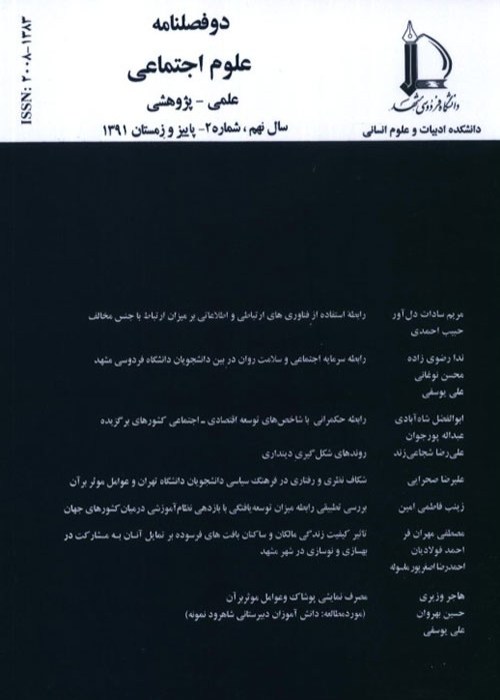The Social Well-being of University Students and Factors Affecting it
Author(s):
Article Type:
Research/Original Article (دارای رتبه معتبر)
Abstract:
Introduction
World Health Organization has defined health in 1948 as “welfare of complete physical, mental and social well-being, and not just being sick or disabled”. (Officialreport of the World Health Organization, 2002, p. 100).According to this definition, health is a “state of complete physical, mental and social well-being”, (WHO, the international health conference, New York, 19–22 June 1946) and accordingly, social well-being is one of the aspects of individual’s public health. Individuals’ health is one of the basic foundations of a balanced society and clearly the survival of any society depends on its members. Health has a direct impact on individual’s quality of life; hence, that’s why scientists have considered health issuesfor a long time andconducted many studies on physical and mental health. However, social well-being is one of the most important aspects of health that has been ignored and less attention has been paid to it by researchers.Theoretical Framework: In this study, Keyes’s (1998) theory has been taken as a definition model and the framework to provide indicators of social well-being. According to Keyes (1998), social well-being refers to the appraisal of one’s own circumstances and functioning in society. Keyes defined five dimensions of social well-being, namely, social integration, social acceptance, social contribution, social realization and social coherence. Social integration consists of individuals’ appraisal of the quality of their own relation with society and community. It refers to the degree to which people feel they have something in common with others and they belong to their own community, in contrast to feelings of isolation and loneliness. Social acceptance refers to positive attitudes toward other people.Individuals who get a higher score on this dimension trust others and have favorable opinions on the human nature. Social contribution refers to the feeling of being a vital member of the society, with something important to offer to the world. Social actualization is the evaluation of the potentials of society and social groups, and corresponds to the idea that society has potentials that can come true by institutions and citizens. Social coherence refers to the perception of the quality and the organization of social world, and reflects a sense that social life and society are meaningful and intelligible.
Methodology
The study population included all students at Ferdowsi University of Mashhad in the academic year 2012 that were selected using stratified sampling with an estimated sample size of 379. The instruments of the study were Keyes’s (1998) Social Well-being Scale,Hiobner’s(1991) Life Satisfaction Scale, and Social Support Scale as well asdemographic information of participants. The participantswere randomly selected from 15 faculties based on academic disciplines, gender, and the number of students enrolled in each faculty. The Reliability of the scales were assessed by Cronbach's alpha and all of the scales were above 0.70; as a result, it indicated that the questionnaireswere reliable. Furthermore, Factor Analysis was used to assess the validity of the questionnaires. Accordingly, the findings showed thatall five dimensions of social well-being loaded truly on their factor in accordance with Keyes theory.Results
The respondents were 22.7 years oldin average (176male and 203 female). The majority of students were single (about 77 percent). In this study, the mean score of social well-being is 65.7. In otherwords, it can be concluded that the social well-being of Ferdowsi university students is above average. The students hit the highest point of social well-being in social integration dimension and also the minimum score was in the dimension of social acceptance. There was no significant relationship between gender and dimensions of social well-being, except for social actualization. The results show that some variables including age, marital status, and membership in student associations, being satisfied with life, and having social support affect social well-being. The result of regression analysis shows that three variables including age, satisfaction with life and social support affect social well-being simultaneously. Multiple correlation coefficient factors affecting social well-being is 0.51, coefficientof determinationis 0.26, and adjusted coefficientof determination is 0.25.
Conclusion
The average social well-being scores show that Ferdowsi University students are in a good position in this case. Among five dimensions, respondents have got the highest score in social integration and with a little difference in social contribution while they have got the lowest score in social acceptance. Social integration represents the evaluation of the quality of individual’s relationship with the community; a high level of this dimension represents a sense of belonging to the community and believing to common things between people and community.The results about social acceptance illustrates that students have not a positive attitude toward the people; in other words, it shows the low level of social trust among them. In this research, it is approved that social support, as the most influential variable, can play an important role in improving student’s social well-being. Thus, it is necessary that family and university pay attention to this matter. In addition, university can improve the social well-being of students by facilitating student’s communications with each other and with student’s associationsKeywords:
Language:
Persian
Published:
Journal of Social Sciences, Volume:14 Issue: 2, 2017
Pages:
31 to 56
magiran.com/p1887374
دانلود و مطالعه متن این مقاله با یکی از روشهای زیر امکان پذیر است:
اشتراک شخصی
با عضویت و پرداخت آنلاین حق اشتراک یکساله به مبلغ 1,390,000ريال میتوانید 70 عنوان مطلب دانلود کنید!
اشتراک سازمانی
به کتابخانه دانشگاه یا محل کار خود پیشنهاد کنید تا اشتراک سازمانی این پایگاه را برای دسترسی نامحدود همه کاربران به متن مطالب تهیه نمایند!
توجه!
- حق عضویت دریافتی صرف حمایت از نشریات عضو و نگهداری، تکمیل و توسعه مگیران میشود.
- پرداخت حق اشتراک و دانلود مقالات اجازه بازنشر آن در سایر رسانههای چاپی و دیجیتال را به کاربر نمیدهد.
In order to view content subscription is required
Personal subscription
Subscribe magiran.com for 70 € euros via PayPal and download 70 articles during a year.
Organization subscription
Please contact us to subscribe your university or library for unlimited access!


